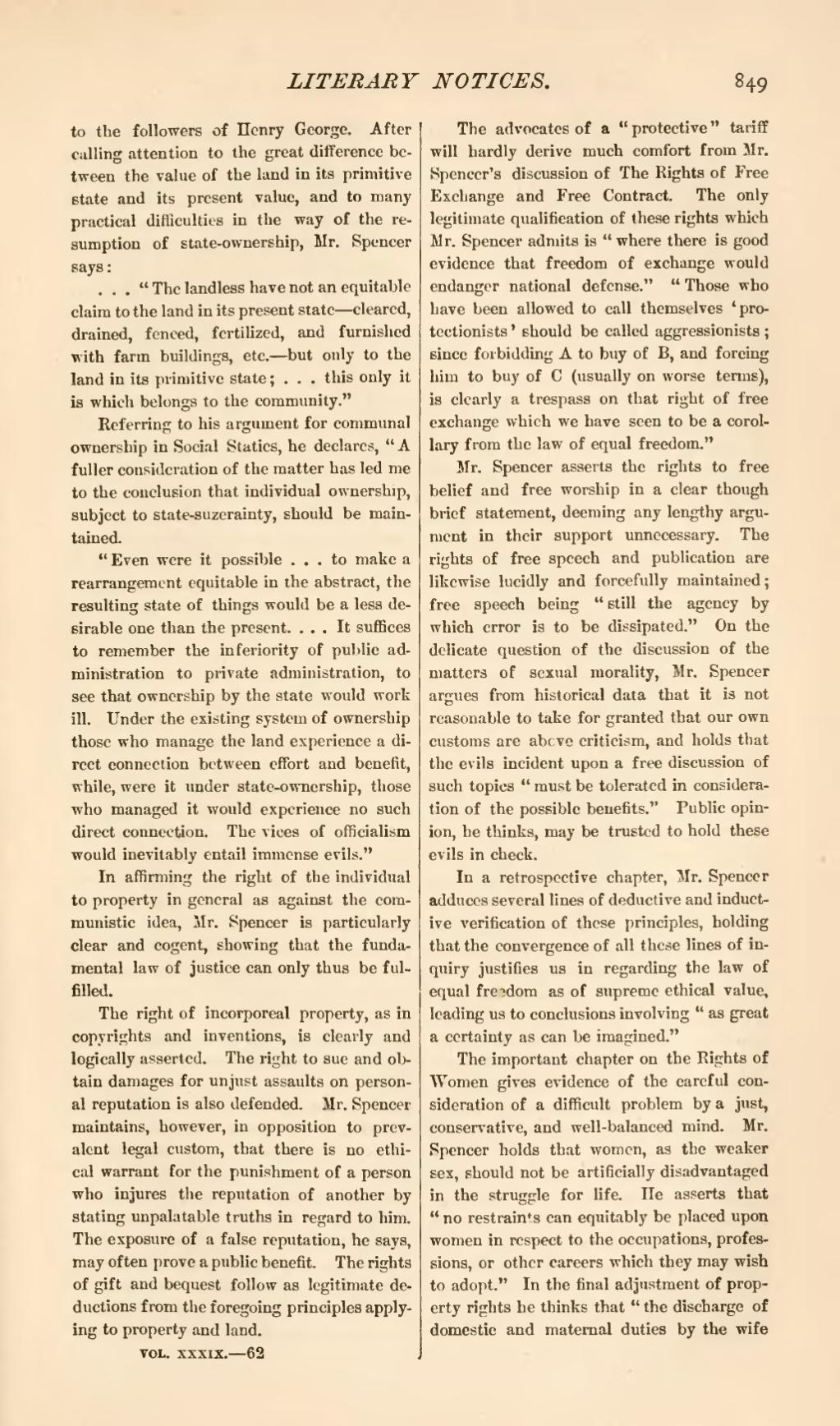to the followers of Henry George. After calling attention to the great difference between the value of the land in its primitive state and its present value, and to many practical difficulties in the way of the resumption of state-ownership, Mr. Spencer says:
. . ."The landless have not an equitable claim to the land in its present state—cleared, drained, fenced, fertilized, and furnished with farm buildings, etc.—but only to the land in its primitive state; . . . this only it is which belongs to the community."
Referring to his argument for communal ownership in Social Statics, he declares, "A fuller consideration of the matter has led me to the conclusion that individual ownership, subject to state-suzerainty, should be maintained.
"Even were it possible. . . to make a rearrangement equitable in the abstract, the resulting state of things would be a less desirable one than the present. . . . It suffices to remember the inferiority of public administration to private administration, to see that ownership by the state would work ill. Under the existing system of ownership those who manage the land experience a direct connection between effort and benefit, while, were it under state-ownership, those who managed it would experience no such direct connection. The vices of officialism would inevitably entail immense evils."
In affirming the right of the individual to property in general as against the communistic idea, Mr. Spencer is particularly clear and cogent, showing that the fundamental law of justice can only thus be fulfilled.
The right of incorporeal property, as in copyrights and inventions, is clearly and logically asserted. The right to sue and obtain damages for unjust assaults on personal reputation is also defended. Mr. Spencer maintains, however, in opposition to prevalent legal custom, that there is no ethical warrant for the punishment of a person who injures the reputation of another by stating unpalatable truths in regard to him. The exposure of a false reputation, he says, may often prove a public benefit. The rights of gift and bequest follow as legitimate deductions from the foregoing principles applying to property and land.
The advocates of a "protective" tariff will hardly derive much comfort from Mr. Spencer's discussion of The Rights of Free Exchange and Free Contract. The only legitimate qualification of these rights which Mr. Spencer admits is "where there is good evidence that freedom of exchange would endanger national defense." "Those who have been allowed to call themselves 'protectionists' should be called aggressionists; since forbidding A to buy of B, and forcing him to buy of C (usually on worse terms), is clearly a trespass on that right of free exchange which we have seen to be a corollary from the law of equal freedom."
Mr. Spencer asserts the rights to free belief and free worship in a clear though brief statement, deeming any lengthy argument in their support unnecessary. The rights of free speech and publication are likewise lucidly and forcefully maintained; free speech being "still the agency by which error is to be dissipated." On the delicate question of the discussion of the matters of sexual morality, Mr. Spencer argues from historical data that it is not reasonable to take for granted that our own customs are abeve criticism, and holds that the evils incident upon a free discussion of such topics "must be tolerated in consideration of the possible benefits." Public opinion, he thinks, may be trusted to hold these evils in check.
In a retrospective chapter, Mr. Spencer adduces several lines of deductive and inductive verification of these principles, holding that the convergence of all these lines of inquiry justifies us in regarding the law of equal freedom as of supreme ethical value, leading us to conclusions involving "as great a certainty as can be imagined."
The important chapter on the Rights of Women gives evidence of the careful consideration of a difficult problem by a just, conservative, and well-balanced mind. Mr. Spencer holds that women, as the weaker sex, should not be artificially disadvantaged in the struggle for life. lie asserts that "no restraints can equitably be placed upon women in respect to the occupations, professions, or other careers which they may wish to adopt." In the final adjustment of property rights he thinks that "the discharge of domestic and maternal duties by the wife

